#Fanny Price
Explore tagged Tumblr posts
Text
I love you "boring" female characters. I love you ingenues. I love you female characters who aren't "modern" enough. I love you female characters who aren't "badass" enough. iI love you female characters who aren't "empowering" enough. I love you quiet female characters. I love you unappreciated female characters. I love you polite female characters. I love you female characters who "can't appeal to modern audiences." I love you frightened female characters. I love you female characters labeled as not complex just for being nice. I love you female characters who get criticism just for not being their tomboy or femme fatale counterpart. I love you silk hiding steel trope.
#literature#theatre#movies#cosette fauchelevent#anne elliot#fanny price#elinor dashwood#alicent hightower#sansa stark#meg march#beth march#if you guys can think of any more let me know#much ado about nothing hero#feminism#but if I see this get labeled as trad fem it's blocked on sight#jane seymour#jane bennet#juliet capulet#Snow White#Cinderella#aurora#princess aurora#lucie manette#elain archeron#emma carew#phoebe dysquith#christine daae#stella ransome#cordelia#desdemona
14K notes
·
View notes
Text







MANSFIELD PARK (1999)
dir. patricia rozema
#mansfield park#mansfield park 1999#jane austen#costume drama#period drama#perioddramaedit#perioddramagif#onlyperioddramas#austenedit#janeaustenedit#period film#perioddramasource#weloveperioddrama#filmtvcentral#filmtvdaily#filmtvedit#movieedit#moviegifs#filmgifs#filmedit#fanny price#edmund bertram#frances o'connor#johnny lee miller#my gifs#mine
181 notes
·
View notes
Text
Fanny Price 🤝 Emma Woodhouse
Cannot leave the house unless there is a babysitter for her parental figure
Has attended one impromptu ball and one real one in her entire life
There is something worth seeing 10 miles from her house. She hasn't seen it.
Most intelligent person in the house at (almost) all times
Falls for the most constant person in her life
#jane austen#emma#emma woodhouse#fanny price#mansfield park#so weird that there is so much in common between the richest and poorest heroine
190 notes
·
View notes
Text
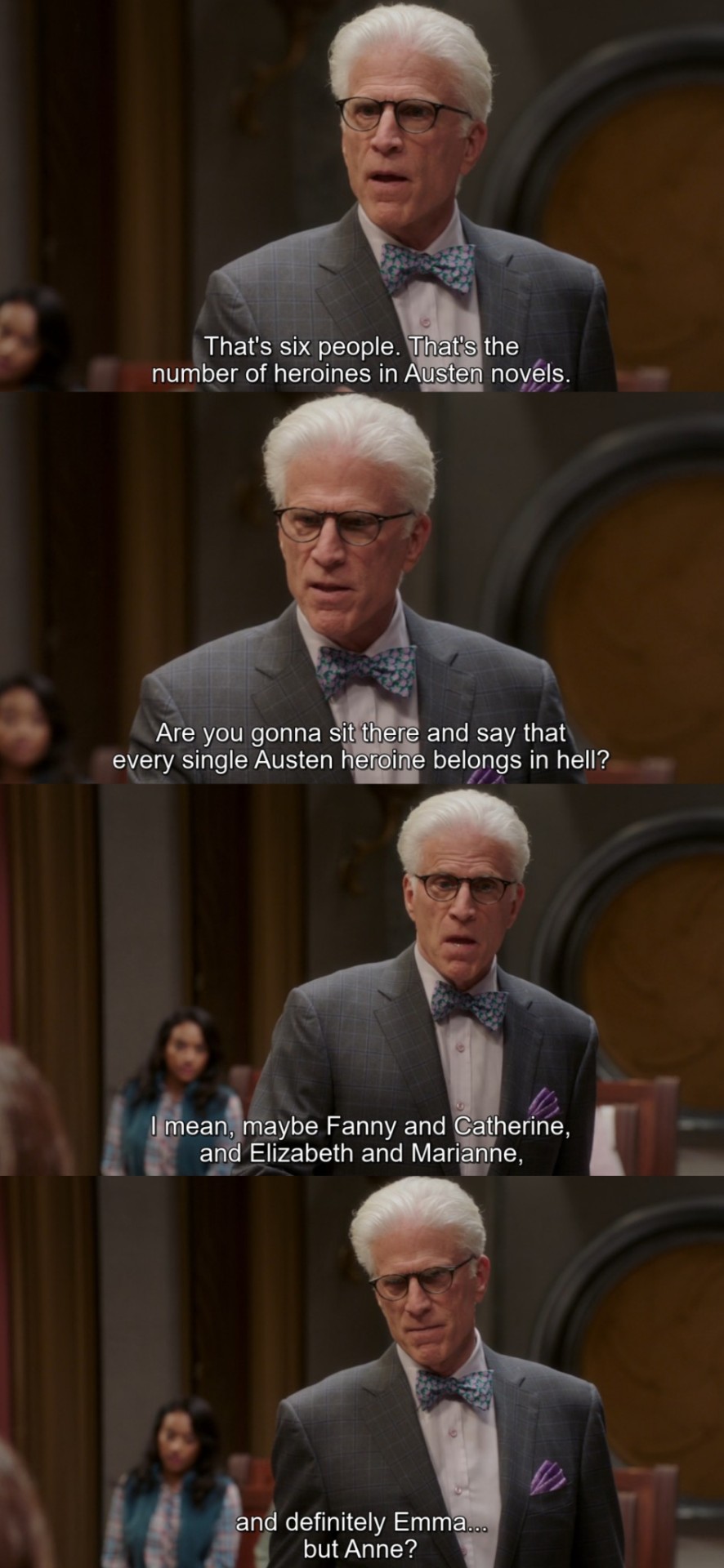
#jane austen#the good place#pride and prejudice#emma#persuasion#sense and sensibility#northanger abbey#mansfield park#anne elliot#elizabeth bennet#marianne dashwood#fanny price#catherine morland#emma woodhouse#tgp#my posts#i feel like i need to explain this 😂#this just came to me when i realized the numbers matched up#and no shade to any of the girls!! i love them all!!#but anne is definitely the best person among them in the tgp sense#(don't) notice i switched elinor for marianne bc otherwise i couldn't choose between elinor and anne 😗#also check the notes for the fanny explanation
2K notes
·
View notes
Text
Character Analysis – Edmund Bertram
I have a better opinion of Edmund Bertram than much of the Jane Austen fandom has, and I am going to try to explain why. It comes down to several things:
1) He probably makes more sacrifices for people other than a woman he is in love with than any other Jane Austen hero.
He has to sacrifice a great deal of the economic condition he would normally expect in order to enable Tom’s debts to be paid, and Tom doesn’t even care about this or feel guilty for it. At no point does Edmund show hostility to or resentment of his brother over this, nor does he ever bring it up to Tom to guilt him, not even when Tom is doing something Edmund considers immoral and disrespectful to their father; Edmund makes his arguments against the play on the merits, as best he can. Nor does he bring it up to Tom when the (relative to expectations) small income he can expect is one of the principal barriers to him marrying the woman he loves.
He goes out of his way to be kind to Fanny from the start (seriously, how few 16-year-old boys would take the time to listen and be kind to and help a ten-year-old girl? Most 16-year-old boys are dreadful, from my experience of high school.)
He sells one of his horses to buy one that Fanny can ride, when riding is recommended for her health. This is no small thing, given how frequently-used horses were in that time. This isn’t like, say, selling one of your three cars; it’s more like choosing to give up either your computer, tablet, or cell phone, and never (or, well, for many years) have a replacement again. Lending the horse to Mary Crawford for a couple days is a fault, but to me a fairly minor fault in light of this.
He is determined that he will live in his parsonage rather than – as would be done by many members of the clergy in that day – live at Mansfield Park and ride over once a week to preach. It is important to him that he do his job well and live among the people he is ministering to, and he is not tempted to try to modify his parsonage into a much fancier house when Henry Crawford tries to talk him into it. Nor is he willing to pursue a career that Mary Crawford would be more favourable to. He genuinely cares about his vocation as a pastor, and is willing to make sacrifices both of love and of comfort in order to do so. I don’t generally have a high opinion of the 19th-century Anglican clergy, Edmund is genuinely dedicated.
He tends to Tom gently and fairly continuously when Tom is sick, despite Edmund having plenty of worries of his own. The book says, “when able to talk, or be talked to, Edmund was the companion he preferred.” Edmund put off a proposal to the woman he loves in order to tend to Tom – and that tending is a duty that would, I think, usually have been considered as one for the women of the family. It really highlights how Edmund is the only Bertram with real feeling and care for his family members.
In light of this, I think that some of the things readers heavily criticize him for, like losing track of time one afternoon when he’s on an outing with his girlfriend, are comparatively minor and forgiveable. Edmund seems to me to put more concerted effort into doing the right thing than most other men in Jane Austen.
2) His ability to act is constrained relative to most other Austen heroes by the fact that he is a younger son, living at home, with two parents and an aunt still living. He does not have the authority to spend Sir Thomas’ money, and filial duty means he cannot outright denigrate Mrs. Norris to Fanny. The only other Jane Austen heroes who do not have their independence are Edward Ferrars and Henry Tilney (and both of them have rather different relationships with their family).
This means anything he does for Fanny, he has to do at his own expense – as when he sells one of his horses to buy one for her; as when he offers to stay with his mother while the others go to Sotherton so that Fanny can go. It’s the most effective way he has of addressing the way they treat her: oh, so you think it’s okay if this happens to Fanny? Well then, it’s happening to me instead. In the case of the Sotherton expedition, it quickly flips people to seeing that as unacceptable, making them bother to find another (fairly simple) solution that they hasn’t cared about finding before.
In a few ways, Edmund is placed in a more feminine role in the story than any other male leads: his principal good qualities are a strong moral sense and the provision of emotional support and care; he’s the bedrock of his family in the same way that Elinor Dashwood is for hers; he’s held back from the person he loves by economic precarity; and he seems to have a limited social circle outside his family (the drinking-and-gambling habits common in young male society among students of his class and time likely didn’t suit him).
In short, Henry Crawford does not care for and value Fanny Price more (or nearly as much) as Edmund does; his financial and familial position simply make it easy for him to do things, at insignificant cost to himself, that Edmund cannot do without behaving in a way that would, in his time, be deeply disrespectful to his parents and aunt. Edmund knows Fanny far better, understands her far better, and when he gives her gifts (like the necklace) it’s ones she likes and appreciates.
3) I don’t blame Edmund for being in love with Mary Crawford for much of the book because, frankly, she’s an appealing person, especially given Edmund’s narrow social circle. The combination of wit, liveliness, comsistent good humour, interesting conversation, and beauty (plus harp-playing) that she beings are not something the Bertrams encounter every day. He wants to think better of her than she is because her other characteristics are so appealing. I think that’s a very human reaction when in love. (Elizabeth Bennet falls for Wickham and makes excuses for him based on little more than good manners, good looks, flattery, and a mutual dislike of Darcy, and people don’t criticize her nearly as much.)
By the same token, I don’t blame him for being oblivious to Fanny’s love for him because absolutely everyone is and Fanny is very deliberately and determinedly concealing it. And given that, liking to spend somewhat more time with your girlfriend than your bestie is also, I think, quite forgivable in a young person.
4) On one area of frequent critique, that Edmund doesn’t listen to Fanny on several notable occasions (mainly about the Crawfords), I think their dynamic over several years is an important consideration. It’s somewhat a flipped version of Emma in that you’ve got a mentor-mentee relationship between the leads, but in this case it’s the mentor who is mistaken and the mentee who is right. Edmund has been supporting and advising and encouraging Fanny for many years, and many of those times he was right. For example, she was afraid of learning to ride when she first started with a pony, and Edmund encouraged her and comvinced her to do it, and she came to love it.
“Ah! cousin, when I remember how much I used to dread riding, what terrors it gave me to hear it talked of as likely to do me good; – (Oh! how I have trembled at my uncle’s opening his lips if horses were talked of) and then think of the kind pains you took to reason and persuade me out of my fears, and comvince me that I should like it after a littl while, and feel how right you proved to be, I am inclined to hope you may always prophesy as well.”
Fanny also, in another conversation, describes herself to Edmund as “foolish and awkward” and he insists “you have not a shadow of either, but in using the words so improperly.” The narrative is clear about how consistent and important his care, sympathy, praise, and advoacy have been for her, for many years:
Edmund’s friendship never failed her: his leaving Eton for Oxford made no change in is kind dispositions, and only afforded more frequent opportunities of providing them. Without any display of doing more than the rest, or any fear of doing too much, he was always true to herinterests,and considerate of her feelings, trying to make her good qualities understood, and to conquer the diffidence which prevented their being more apparent; giving her advice, consolation, and encouragement.
Kept back as she was by every body else, his single support could not bring her forward, but his attentions were otherwise of the highest importance in assisting the improvement of her mind, and extending its pleasures. He knew her to have a quick apprehension as well as good sense, and a fondness for reading, which, properly directed, must be an education in itself…he recommended the books which charmed her leisure hours, he encouraged her taste, and corrected her judgement; he made reading useful by talking to her of what she read, and heightened its attraction by judicious praise.
The nature of this relationship also helps explain some of Edmund’s reaction to Henry Crawford’s proposal: while Edmund is very much at fault for disregarding her doubts about Henry Crawford’s morality, he is very used to Fanny being nervous and anxious about things that, once she is used to the and no longer afraid of them or uncertain of her abilities, she enjoys. (Such as riding.) So he is seeing her reaction in part through that frame.
The basic difficulty in Mansfield Park that affects perceptions of Edmund is that it is occurring at a moment of transition: the first time Fanny has been eclipsed in Edmund’s life, combined with a transition from him being a mentor and guide to them becoming equals, and her in fact surpassing him in perception and being willing to go against even his opinion in her choice to reject Henry Crawford. It’s the story of Fanny growing up, whereas Edmund (the mentor) is put in the place of Emma (the mentee) in Emma, in being mistaken in key assessments of people, and biased into seeing what he wants to see. This reversal is what allows them to be on equal footing, and for Edmund’s benefit from Fanny’s companionship to be as apparent or more apparent, to everyone, as his from her.
However, this means that for most of the novel we’re seeing Edmund and Famny’s relationship at the weakest point it’s ever been, which can’t help but affect readers’ attitudes to him; and I do think it’s a flaw that we don’t get an actual conversation at the end between Edmund and Fanny that deals with his recognition of his errors in judgement and the value of her perception and principle.
217 notes
·
View notes
Text
A Ranking of Jane Austen Heroines, in Ascending Order of Culpability
Fanny (Mansfield Park): Has done nothing wrong ever in her life (but would never say this as she is far too humble).
Elinor (S&S): Must have scoliosis from carrying the whole weight of the Dashwood family at the ripe old age of 19. Should probably have asked for help by now, but who's she going to ask? Her mother? Unlikely.
Anne (Persuasion): Pros: is the only functioning member of her family. Cons: took some really bad advice when she was 17.
Elizabeth (P&P): So dead-set on hating Mr. Darcy that she falls hook-line-and-sinker for the lies Wickham tells her with no questions asked. Otherwise has good sense.
Marianne (S&S): Throws herself headlong into the Romantic Experience™️ and gets her heart broken by a playboy when Colonel Brandon is literally RIGHT THERE.
Catherine (Northanger Abbey): Good-hearted, but easily led astray. So obsessed with Gothic novels that she kind of accuses Mr. Tilney's father of murdering his wife and burying her in the basement.
Emma (Emma): Tells Harriet to refuse the nice guy she likes, too prideful to see that Mr. Elton is pursuing her instead of Harriet, gossips about Jane Fairfax, feels like the rules don't apply to her, won't listen to Mr. Knightly. Is a menace.
#emma is actually my favorite lol#and then eleanor#jane austen#textpostsbymellpen#pride and prejudice#sense and sensibility#mansfield park#northanger abbey#persuasion#emma jane austen#elizabeth bennet#elinor dashwood#marianne dashwood#catherine morland#fanny price#anne elliot#convoswithmoystarushka
2K notes
·
View notes
Text
fanny price DOES get a great happy ending, fight me
like okay no, fanny does not successfully tame the Rake and reform him into a sexy sexy faithful husband. yes, we could argue all day about whether edmund bertram is underrated or a soggy biscuit of a man, but that fact is ultimately IRRELEVANT. HE is irrelevant except as like. a piece of the broader picture the ending of mansfield park only sucks if you're viewing it from the extremely narrow and shallow lens of like: the modern capital R romance, where the woman's happily-ever-after is defined by her attaining the Ideal/Most Desirable Man™. but that's not what the novel is about!
fanny price's happy ending is BEING PROVEN RIGHT AND HER WORTH ACKNOWLEDGED after putting up with YEARS of fucking bullshit despite CONSTANTLY being a better judge of character, of morals, of good sense, than literally ANYONE ELSE AROUND HER. fanny price's happy ending is her spending months going 'HMM I"M GETTING BAD VIBES' and everyone saying 'stfu fanny you don't know shit' and at the end of the novel she gets to watch everyone else either blows up their entire life as a result of ignoring The Vibes, or fall over her trying to apologize because HOLY SHIT FANNY WHY DID WE NOT LISTEN TO YOU ABOUT THOSE VIBES and people being like WE TOOK YOU SO FUCKING FOR GRANTED WE FUCKED UP'
and she is like: yes, I know this, and finally everyone else does too, and that is literally all i have ever wanted in life fanny price's happy ending is people apologizing and acknowledging her worth fanny price's happy ending is basically the equivalent of her sitting there smiling with genteel energy while her inner self is performing this dance

and honestly: i love that for her
#mansfield park#jane austen#fanny price#are you ever like: i need to go to bed early#but i need to yell at the internet about mansfield park more
422 notes
·
View notes
Text
The critic who wrote the introduction to my copy of Mansfield Park- "No one is able to like the heroine".
Sounds like a skill issue. Not me and the girlies on Tumblr.com though. We get it.
#mansfield park#fanny price#jane austen#how dare they go for my girl like that#I'll fight them in a parking lot
338 notes
·
View notes
Text
i think I've reached the point where I must acknowledge that Fanny Price from Mansfield Park is now a fully-fledged blorbo of mine
#Jane Austen#Mansfield Park#Fanny Price#she's the Ideal Regency Feminine and the Perfect Victim and has all the trappings of a Gothic Heroine#and all three are trauma responses!!!!#and also she's not really a perfect victim but a whole lot of people who read the book sure do fall into the trap of thinking that she is#but like... the book's perspective on her is too interior ie she is too much of a person to actually be a perfect victim#the more you play the perfect victim role to survive the more of your personhood you have to trade in#and the more you get revealed to be a whole textured person the further out of reach is the role of perfect victim#in a lot of ways Fanny DOES play the perfect victim externally towards the other characters! that's one of her main survival tactics#but we the readers have no excuse for only seeing that part cause we're also shown her interiority IF we care to actually look at it
96 notes
·
View notes
Text
Fanny is literally just sitting, not bothering anyone, keeping her own peace, and she still gets berated repeatedly for the sheer "audacity" of her existence.
I need the Bertrams to all go drown in a lake omfg
#dreamer reads#fanny price#mansfield park#jane austen#she literally isn't doing anything to any of you!#wtf!!!!
103 notes
·
View notes
Text
Rereading Mansfield Park and this section struck me:
Susan saw that much was wrong at home, and wanted to set it right. That a girl of fourteen, acting only on her own unassisted reason, should err in the method of reform, was not wonderful; and Fanny soon became more disposed to admire the natural light of the mind which could so early distinguish justly, than to censure severely the faults of conduct to which it led. Susan was only acting on the same truths, and pursuing the same system, which her own judgment acknowledged, but which her more supine and yielding temper would have shrunk from asserting. Susan tried to be useful, where she could only have gone away and cried; and that Susan was useful she could perceive; that things, bad as they were, would have been worse but for such interposition, and that both her mother and Betsey were restrained from some excesses of very offensive indulgence and vulgarity. Ch 40
So often people say that Fanny is without faults, but her reluctance to take action is a fault, even if it's an understandable one. William hopes aloud that Fanny will set things right at home, but Fanny is so afraid of giving offence and so timid that this proves to be impossible. Her adoption and education of Susan is lovely, but while she knows what is right, it's very hard for her to share it widely.
It makes me wonder about Edmund's insisting:
"...You will supply the rest; and a most fortunate man he is to attach himself to such a creature—to a woman who, firm as a rock in her own principles, has a gentleness of character so well adapted to recommend them. He has chosen his partner, indeed, with rare felicity. He will make you happy, Fanny; I know he will make you happy; but you will make him everything.”
This is his rose-coloured glasses problem, because every time Fanny does attempt to give advice in any way, it's usually to a trusted person (Edmund) and she does it with extreme reluctance.
105 notes
·
View notes
Text
I'm reading Mansfield Park properly for the first time and omg there are actual people who dislike FANNY????!!!!!! How? Why? In what universe?????
92 notes
·
View notes
Text
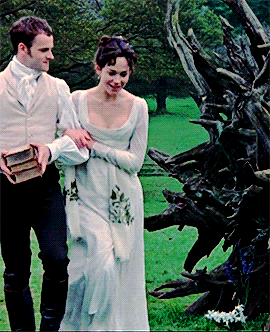
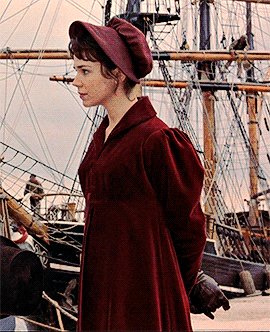
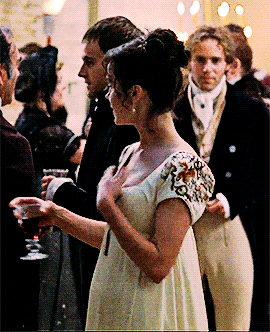
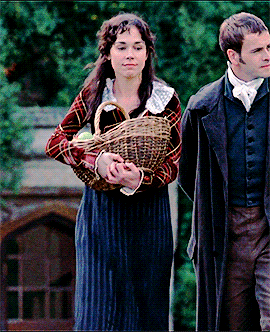

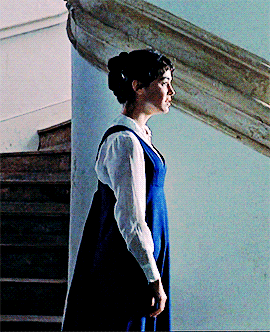

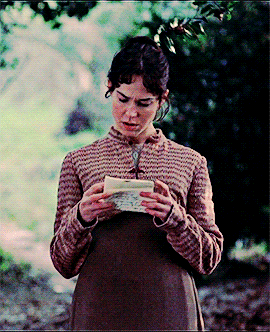
Fanny Price's wardrobe in MANSFIELD PARK (1999)
#costumegifs#perioddramaedit#perioddramasource#mansfield park#filmedit#austenedit#fanny price#mine#q#period dramas#cinema
527 notes
·
View notes
Text



Illustrations for Jane Austen's 'Mansfield Park'
Entry for Folio Society competition
2016
By Emily Yendle
419 notes
·
View notes
Text

#i want that reformed rake ending#yes jane I know what you were doing but you made him too charming#jane austen#mansfield park#classic lit memes#fanny price#henry crawford
56 notes
·
View notes
Text
just saw an Austen Fan™️ say that Mansfield Park has literary merit “”in spite of”” Fanny being a “somewhat unlikable protagonist” like what???? she’s literally just traumatized and introverted you don’t have to go after her like that
444 notes
·
View notes